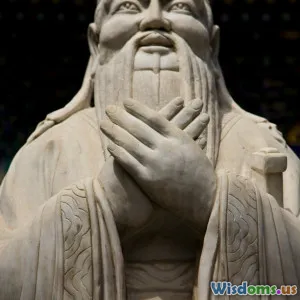
Navigating Life's Purpose: Insights from Ancient Wisdom
7 min read Explore timeless ancient wisdom to discover pathways for navigating life's purpose and enriching your spiritual journey. (0 Reviews)
Navigating Life's Purpose: Insights from Ancient Wisdom
Introduction: Awakening to the Search for Meaning
In a world overflowing with noise, choices, and seemingly conflicting advice, the quest to discover one's life purpose can feel both exhilarating and overwhelming. Yet across millennia and diverse cultures, human beings have sought this very understanding. Ancient wisdom, carefully preserved through sacred texts, oral traditions, and reflective philosophies, offers strikingly relevant insights that cut across time. This article invites you on a journey through these enduring teachings to explore how they illuminate the path to a purposeful life.
The Timeless Human Quest: Why Purpose Matters
Purpose is the compass that fosters meaning, resilience, and fulfillment. Neuroscientific studies corroborate its importance: having a clear life purpose correlates with improved mental health, longer lifespan, and a stronger immune system (Psychological Science, 2019). Ancient traditions intuited these benefits without modern science. For example, the Stoics believed that purpose anchored the soul amidst life’s tempests, as Marcus Aurelius wrote, “The impediment to action advances action. What stands in the way becomes the way.”
Ancient Wisdom Traditions and Their Approach to Purpose
1. The Bhagavad Gita – Duty as Dharma
One of the premier spiritual texts from ancient India, the Bhagavad Gita, addresses purpose within the framework of "dharma," or righteous duty. The warrior Arjuna faces a moral crisis before battle, and Krishna counsels him to act according to his role without attachment to outcomes. This idea highlights that life's purpose may be entwined with fulfilling one’s responsibilities authentically. Scholar Eknath Easwaran notes, “Living one’s dharma is living in harmony with the universe.”
2. Taoism – Flow and Alignment with the Tao
Taoism, a philosophy penned by Laozi, suggests that purpose is not a destination but a state of harmony with the natural order—the Tao. The Tao Te Ching advises effortless action, or "wu wei," encouraging individuals to align with the flow of life rather than forcefully pursuing predetermined goals. This wisdom is echoed today in psychological concepts like "flow state," which links deep engagement with well-being.
3. Aristotle’s Eudaimonia – Flourishing Through Virtue
The ancient Greek philosopher Aristotle proposed that life’s purpose rests in achieving "eudaimonia," often translated as flourishing or thriving. For Aristotle, this meant living virtuously—expressing reason and character excellently within the community. As he famously stated in Nicomachean Ethics, "the good for man is an activity of the soul in conformity with excellence or virtue." This practical approach connects purpose with everyday choices.
4. Buddhism – Liberation Through Insight
In Buddhist thought, the core purpose of life is liberation from suffering through mindfulness, ethical conduct, and wisdom. The Four Noble Truths outline a path whereby understanding the nature of craving dissolves existential dissatisfaction. This ancient formula resonates globally today as a method for cultivating peace that transcends circumstance.
Applying Ancient Insights to Modern Life
How can these diverse ancient perspectives be synthesized into actionable insights for contemporary existence?
- Embrace Your Role, Yet Cultivate Detachment: Like Arjuna, consider your current roles and strive to perform them with integrity without being enslaved to outcomes.
- Seek Natural Flow: Align with your environment and rhythms as Taoism recommends. Reflect on when you feel most "in the zone" and harness that momentum.
- Practice Virtue Daily: Identify virtues important to you—honesty, courage, compassion—and weave them consistently into your interactions, thereby building a purposeful character.
- Cultivate Mindfulness and Awareness: Borrow from Buddhism by practicing mindfulness meditation or reflection to gain clarity on desires and reduce suffering tied to false attachments.
Real-World Example: Modern Purpose Seekers Inspired by Ancient Wisdom
Take the example of Dr. Viktor Frankl, a psychiatrist and Holocaust survivor who developed Logotherapy based on the principle that finding meaning in suffering is essential to the human experience. His philosophy, echoing ancient teachings, demonstrates that even in extreme adversity, life’s purpose can be discovered by honoring one's values and commitments.
Similarly, contemporary leaders such as the Dalai Lama integrate Buddhist principles into daily leadership, proving ancient wisdom is not relic but a living practice.
Conclusion: The Eternal Journey to Purpose
The pursuit of life’s purpose is an ongoing expedition rather than a static landmark. Ancient wisdom traditions reveal that such purpose arises from harmonizing duty, virtue, flow, and liberation. By revisiting these age-old insights with an open heart and practical mindset, modern seekers can carve a meaningful path through today’s complexities. Life’s ultimate meaning is not handed down but discovered through conscious reflection connected to both temporal roles and transcendental values. This ancient guidance beckons us to live not by chance but by choice—crafted deliberately, purposefully.
Reflective Prompt: What role do you presently embody, and how might ancient wisdom inspire you to bring deeper purpose into it?
References:
- Easwaran, Eknath. The Bhagavad Gita.
- Aurelius, Marcus. Meditations.
- Aristotle. Nicomachean Ethics.
- Frankl, Viktor. Man’s Search for Meaning.
- Tao Te Ching by Laozi.
- Psychological Science (2019), "Purpose in Life and Health Outcomes"
Embrace this ancient compass. Navigate your life’s waters not aimlessly, but with empowered purpose.
Rate the Post
User Reviews
Popular Posts
















